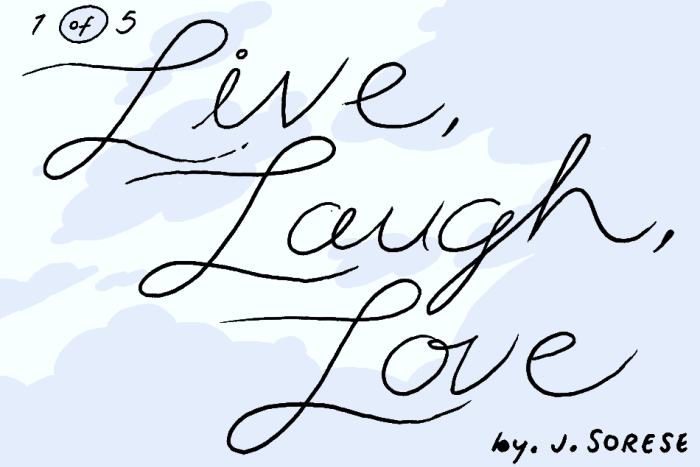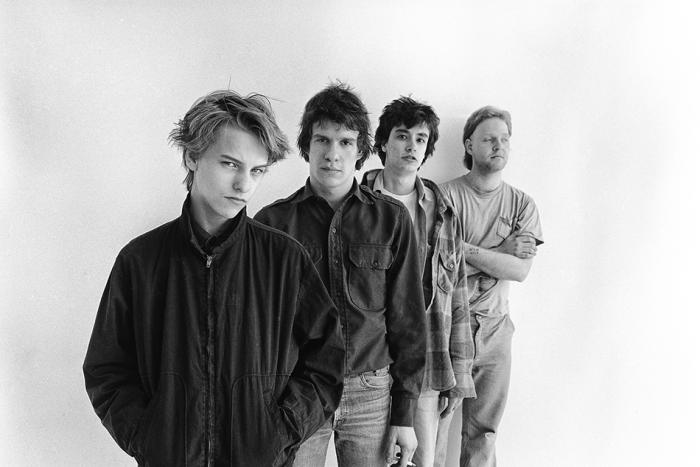The music you hear for the first time when you’re thirteen is important. At thirteen, everything matters so much but nothing has really happened to you yet. You’ve started puberty, but—at least when I was growing up in the ‘80s—you haven’t started drinking or doing drugs or having sex. So you learn about the world through the music you love. I was thirteen in those pre-Internet days when you needed a cool friend or sibling to introduce you to new music, especially in smaller cities like my hometown of Winnipeg. My friend Carla was that person for me—she was the one who introduced me to The Replacements.
There were two songs that struck me and stayed with me, and they were both about drinking, which isn’t too surprising when it comes to The Replacements. I’ll be in a certain kind of mood and those indelible opening lines of “Here Comes A Regular” will come to mind: "Well a person can work up a mean, mean thirst. After a hard day of nothing much at all.” Back then, I thought alcoholics were those guys who drank down by the river. We’d see them on our way home from school and sometimes we’d climb down the bank to say hello, thrilled to be somewhere our parents wouldn’t want us to be. Too scared to crack a bottle and join them.
The other song was “If Only You Were Lonely.” My girlfriends and I would sing it a cappella with three-part harmony and gusto: “…and somewhere there’s somebody a-throwing up.” We had never thrown up from drinking too much; I didn’t even know what beer tasted like. But what I did understand was that sense of futility, that “another day come and gone oh well” feeling. Nothing important ever happened in Winnipeg. Everybody knew this was nowhere. Lives that were wasted in both senses of the word, loneliness that could make you desperate enough to go home with anyone who was lonely enough to take you. What’s the point in raking up the leaves before the snow falls, anyway?
At the time, I didn’t know The Replacements were from Minneapolis, Winnipeg’s unofficial sister city. But now I understand why they felt so familiar. We were both stuck in the middle of the continent, far from the centres of attention.
Out east they got heat
But we got mosquitoes
They got a west coast scene
Lemme tell ya where the grass grows
—“Stuck In The Middle” from Stink EP.
—Julie Penner
Alex Chilton
Paying tribute to a musical hero in a song is a wonderful thing: it tells you where the artist is coming from, and how they envision themselves—or rather, an ideal version of themselves. For Westerberg to pay tribute to Alex Chilton of Big Star—a guy who had a few shots at success and missed, gloriously—tells you a lot about how the 'Mats frontman saw his own band in 1987. He knew they were great, sure, and hearing the glossy production on Pleased To Meet Me in retrospect, you get the impression he wanted to go for broke that time around... though you also get a sense that he knew it was destined to fail. Did he see himself as his generation's Chilton—a guy who would write some of the best songs of the decade, only to be discovered by younger artists who would become far more successful than he ever would be? Or was he simply imagining the crestfallen frontman wandering the streets of his hometown where they recorded this album, hangin' down in Memphis all the while? —Shehzaad Jiwani
Androgynous
The Replacements are, for the most part, known as a guitar band, so it’s a bit strange to think that “Androgynous,” their most ambitious and perhaps timeless song, was created with nothing but a slightly out of tune piano and a shaker. On the surface the track seems at odds with everything The Replacements were in 1984. Slower, sweeter and more earnest than anything before, the ballad is also among the band’s most combative, with Westerberg weaving a narrative about Dick (“wearing a skirt”) and Jane (“sporting a chain”), in a way that’s equally apathetic and antagonistic. There’s an apprehension to the song, and at times the lo-fi production and lethargy of the vocals seem like they were constructed to intentionally undermine the weight of the lyrics. Still, all the tape-hiss in the world can’t distract from the song’s uncharacteristically beautiful sentiments. The Replacements couldn’t be the same band after “Androgynous,” for better or for worse. —Kyle Fulton
Answering Machine
Paul Westerberg's greatest skill is his ability to convey a wide range of emotions yet still come off as conversational rather than self-aggrandizing or saccharine—especially rare when you consider the leagues of raspy voiced, heart-on-their-sleeves imitators the 'Mats would go on to inspire. On Let It Be, an album full of nigh-epochal lines such as "Look me in the eye and tell me that I'm satisfied," "Answering Machine" feels a little more personal. It's just Paul and a guitar, which strikes a unique balance between his trademarked lovable schlub charm with his most vulnerable moment up to that point. Though the titular device may seem archaic in 2016, Westerberg's inability to articulate his feelings still hits home today, even with a hundred ways to communicate with each other. You can picture him at a payphone, waiting for someone to pick up on the other end, not having any idea what he wants to say, just wanting to say anything. Everybody's been there, and that common ground is exactly what makes The Replacements so relatable—they're right there with you the whole time. —Shehzaad Jiwani
Bent Out of Shape
There is a special class for songs you need when you have a crush on someone. When you’re freaking out and dry heaving over the perfect spiral in a lock of hair, the glint of green in someone’s eye, the way they pronounce “baby carrots,” “Bent Out Of Shape” is your spirit guide. Once I listened to this song fifty times in a row and it got better. It’s a song about someone treating you like shit, but learning to love the process. “I smell your hair/the clothes I wear/I miss your face,” sings Westerberg. People turn us into old wire coat hangers, spiky and sharp and useless. I’ve been bent out of shape for years now. The Replacements suggest there’s a place for all us wiry, unloved losers—and maybe even a sense of romance and purpose to all that longing. The Replacements make music for people like me because like all great bands, they are those people too. I’m glad I have this song in my arsenal. —Chandler Levack
Can't Hardly Wait
I think I have spent my entire life looking for a person who is as good as this Replacements song. Who makes you feel this infinite. Who makes the future seem like a dazzling cold plunge into shimmering waters, instead of a low-grade tension headache. I have played this song for strangers to dance to at weddings. I have put it on mixtapes for people to kiss. “Can’t Hardly Wait” is about the dizzying transition from being a child into becoming an adult. It is the only song I know about that makes me excited about the future. If the possibilities were life affirming, this brass-laden, this joyous, no one would be afraid. This song makes me want to get out of bed. —Chandler Levack
Color Me Impressed
When the Replacements played Riot Fest a couple of years ago, in the summer of 2013, the loudest crowd response was saved for “Color Me Impressed,” a sentimental favourite from Hootenanny that simultaneously celebrates and skews the age-old institution of partying hard. Like any Kiss fan worth his salt, the narrator is all for rock and rolling all night—and French kissing an intoxicated lover, because why not?—but there’s also the sense that he’s looking askance at “everybody dressing funny.” He says that they don’t “look” depressed, but looks can be deceiving; a few years later, in “Swinging Party,” Paul Westerberg suggested that inside every reveler is a scared kid worried about being found out. —Adam Nayman
Hold My Life
Or, his life is in your hands. Barely one track into Tim, and our hero is “down on all fives” and exhorting somebody (his girlfriend? His bandmates? His dealer?) to carry him for a little while—you know, until he gets back on his feet. As a generational lament, “Hold My Life” is very much the B-side to “Bastards of Young.” There’s plenty of tension between the tentative tenor of the lyrics and the assertiveness of the music behind them: the riffs aren’t as rough as the stuff on earlier records, but they ring out loud and clear all the same. —Adam Nayman
IOU
The line "I owe you nothing" sums up Paul Westerberg and The Replacements so succinctly for me. Seeing them at their first reunion show in Toronto, and even watching them perform on Jimmy Fallon, the frontman had an expression on his face that made it seem as though he would be just as happy playing these songs in his basement as he would be playing them to thousands of people. That isn't to say he wasn't having fun—the guy was having a blast, he was just enjoying himself on his own terms. When he sings "Want it in writing/I owe you nothing," you can picture his Han Solo-esque smirk the entire time. He loves what he does, but he doesn't need you to love him. That rascally attitude is quintessentially The Replacements. —Shehzaad Jiwani
Little Mascara
For a guy who’s typically praised—or condemned—for being a kind of sensitive-bro bonehead, Paul Westerberg sure wrote a lot of songs about, and from inside the point of view of, interesting female characters. The subject of “Little Mascara” weeps her black-rimmed eyes out for her busted marriage and because her back is against the wall (“for the kids, you stay together”), but there’s no pity or piety in the lyrics. Instead, Westerberg observes how his heroine’s desire for “someone Ma’d be scared of” has come back to haunt her—with the suggestion that the singer might even be the no-account husband in question. —Adam Nayman
Seen Your Video
Let it Be often gets classified as an album of hits and misses, which I never quite understood. Sure, it can be hard to get enthusiastic about a juvenile banger like “Gary’s Got a Boner” after the stark emotion of “Unsatisfied,” but Let it Be, like The Replacements in general, is the sum of its shambolic parts, and in my experience you’ll find the most reward when you take the good with the ugly. For this reason I will always ride for the minor Let it Be tracks such as “Black Diamond,” “Tommy Gets His Tonsils Out”, and especially “Seen Your Video,” the band’s half hearted shrug to the early ‘80’s MTV craze. Nearly instrumental except for its closing mission statement (“Seen your video. That phony rock and roll. We don’t want to know”), the hooky tune might not match the ambition of “Androgynous,” or the untreated emotion of “Answering Machine,” but “Seen Your Video” is a model of the ‘Mats at their overly simplified best. It’s a restraint that we rarely saw from them again, and a demonstration of how great they could be when they chose to pump the breaks.—Kyle Fulton
Unsatisfied
“Unsatisfied” has always stuck out to me as the most completely realized Replacements song, perfectly straddling the line between the raw power of the Twin Tone years and celebration rock of the Sire era. Sonically the ‘Mats would rarely find such a comfortable place again, expertly balancing the discordance and unbridled energy fans depended on, and the overly compressed sound that would launch them to greater fame but also haunt their later records. The track mines all the best aspects of Let it Be, with Westerberg blending the jangly pop perfection of “I Will Dare,” the bravado of “We’re Coming Out” and the defeated frustration of “Answering Machine” to create a song that would sound equally at home at The Longhorn or Midway Park. —Kyle Fulton
Within Your Reach
“Within Your Reach” is how Cameron Crowe chose to end the greatest romantic teen comedy of all time, Say Anything. As Lloyd Dobbler and Diane Court sit on a plane together waiting for the No Smoking sign to ding (she’s afraid of flying; perfect bae John Cusack says that once the sign comes on, they’ll be safe), this song kicks in as the movie goes to black. It’s a fitting comparison since the distorted guitars sound exactly like a jet taking off into an unknown future. I love this song because it’s simple but iconic. Paul Westerberg implores that he can’t live without your touch. But it’s just him alone on this impossibly good jam, reaching for the listener, hoping to envelop them in his arms. I’ve always wanted to know how to hang back in a crowd, say less but mean more, just let it happen. This song is my manifesto. —Chandler Levack
See also: Adam Nayman's interview with Bob Mehr about Trouble Boys, his new book on The Replacements.









